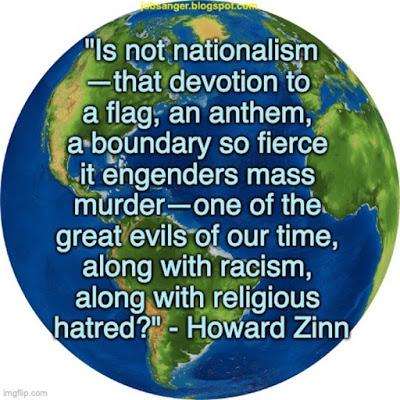 The following is part of an article written by historian Howard Zinn for The Progressive back in 2005. It's as valid today as it was back then.
The following is part of an article written by historian Howard Zinn for The Progressive back in 2005. It's as valid today as it was back then.There was something horrifying in the realization that, in this twenty-first century of what we call “civilization,” we have carved up what we claim is one world into 200 artificially created entities we call “nations” and armed to apprehend or kill anyone who crosses a boundary.
Is not nationalism—that devotion to a flag, an anthem, a boundary so fierce it engenders mass murder—one of the great evils of our time, along with racism, along with religious hatred? These ways of thinking—cultivated, nurtured, indoctrinated from childhood on—have been useful to those in power, and deadly for those out of power.
National spirit can be benign in a country that is small and lacking both in military power and a hunger for expansion (Switzerland, Norway, Costa Rica, and many more). But in a nation like ours—huge, possessing thousands of weapons of mass destruction—what might have been harmless pride becomes an arrogant nationalism dangerous to others and to ourselves.
Our citizenry has been brought up to see our nation as different from others, an exception in the world, uniquely moral, expanding into other lands in order to bring civilization, liberty, democracy.
That self-deception started early. When the first English settlers moved into Indian land in Massachusetts Bay and were resisted, the violence escalated into war with the Pequot Indians. The killing of Indians was seen as approved by God, the taking of land as commanded by the Bible. The Puritans cited one of the Psalms, which says: “Ask of me, and I shall give thee, the heathen for thine inheritance, and the uttermost parts of the Earth for thy possession.”. . .
It was our “Manifest Destiny to overspread the continent allotted by Providence,” an American journalist declared on the eve of the Mexican War. After the invasion of Mexico began, the New York Herald announced: “We believe it is a part of our destiny to civilize that beautiful country.”
It was always supposedly for benign purposes that our country went to war. We invaded Cuba in 1898 to liberate the Cubans, and went to war in the Philippines shortly after, as President McKinley put it, “to civilize and Christianize” the Filipino people. . . .
Nationalism is given a special virulence when it is blessed by Providence. . . .
Nationalist super-patriotism is not confined to Republicans. When Richard Hofstadter analyzed American presidents in his book The American Political Tradition, he found that Democratic leaders as well as Republicans, liberals as well as conservatives, invaded other countries, sought to expand U.S. power across the globe. . . .
One of the effects of nationalist thinking is a loss of a sense of proportion. The killing of 2,300 people at Pearl Harbor becomes the justification for killing 240,000 in Hiroshima and Nagasaki. The killing of 3,000 people on September 11 becomes the justification for killing tens of thousands of people in Afghanistan and Iraq.
What makes our nation immune from the normal standards of human decency?
Surely, we must renounce nationalism and all its symbols: its flags, its pledges of allegiance, its anthems, its insistence in song that God must single out America to be blessed.
We need to assert our allegiance to the human race, and not to any one nation. We need to refute the idea that our nation is different from, morally superior to, the other imperial powers of world history.
The poets and artists among us seem to have a clearer understanding of the limits of nationalism.
Langston Hughes (no wonder he was called before the Committee on Un-American Activities) addressed his country as follows:
You really haven’t been a virgin for so long
It’s ludicrous to keep up the pretext . . .
You’ve slept with all the big powers
In military uniforms
And you’ve taken the sweet life
Of all the little brown fellows . . .
Being one of the world’s big vampires
Why don’t you come out and say so
Like Japan, and England, and France
And all the other nymphomaniacs of power.
Henry David Thoreau, provoked by the war in Mexico and the nationalist fervor it produced, wrote: “Nations! What are nations? . . . Like insects, they swarm. The historian strives in vain to make them memorable.” In our time, Kurt Vonnegut (Cat’s Cradle) places nations among those unnatural abstractions he calls granfalloons, which he defines as “a proud and meaningless association of human beings.”

